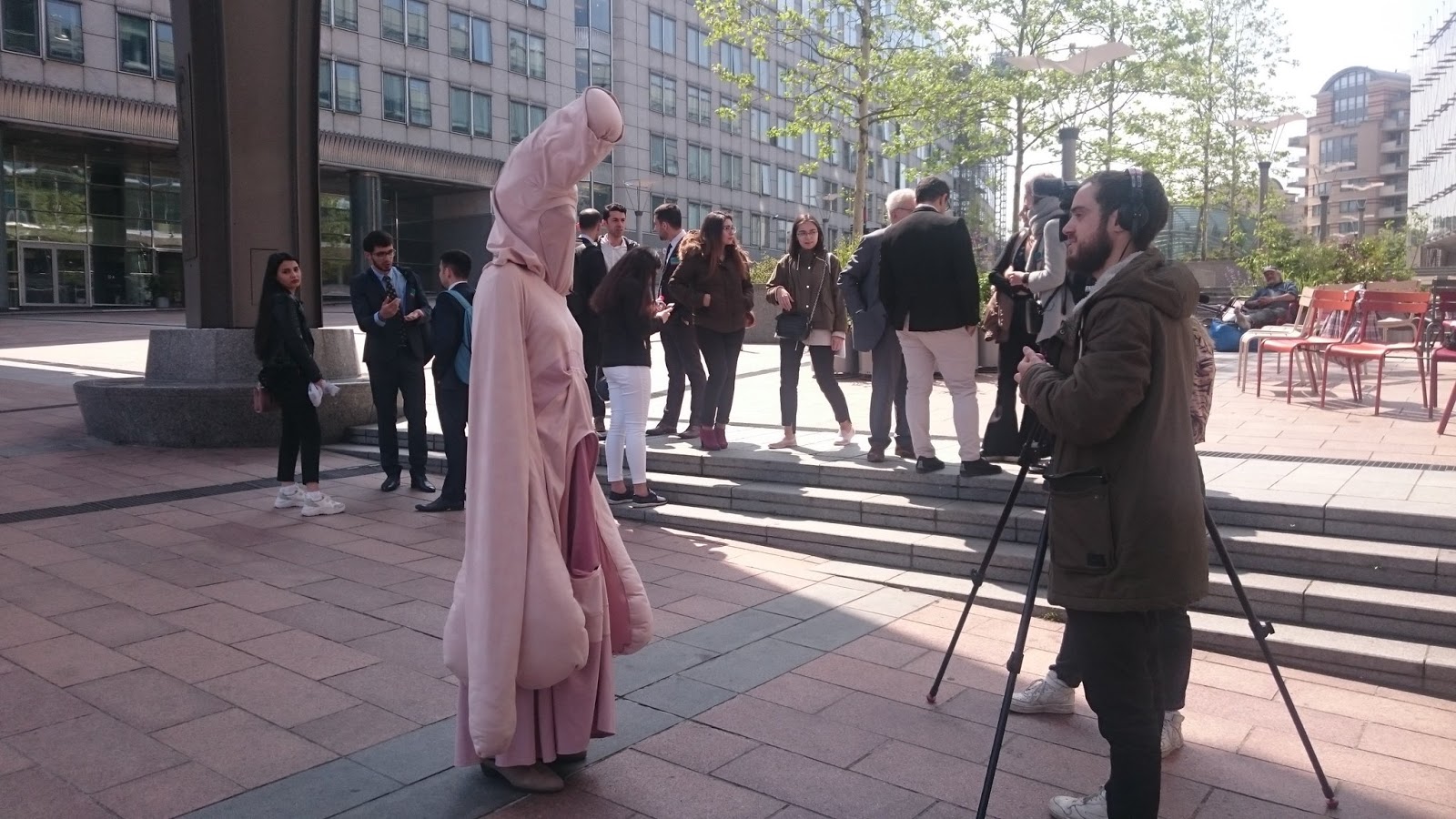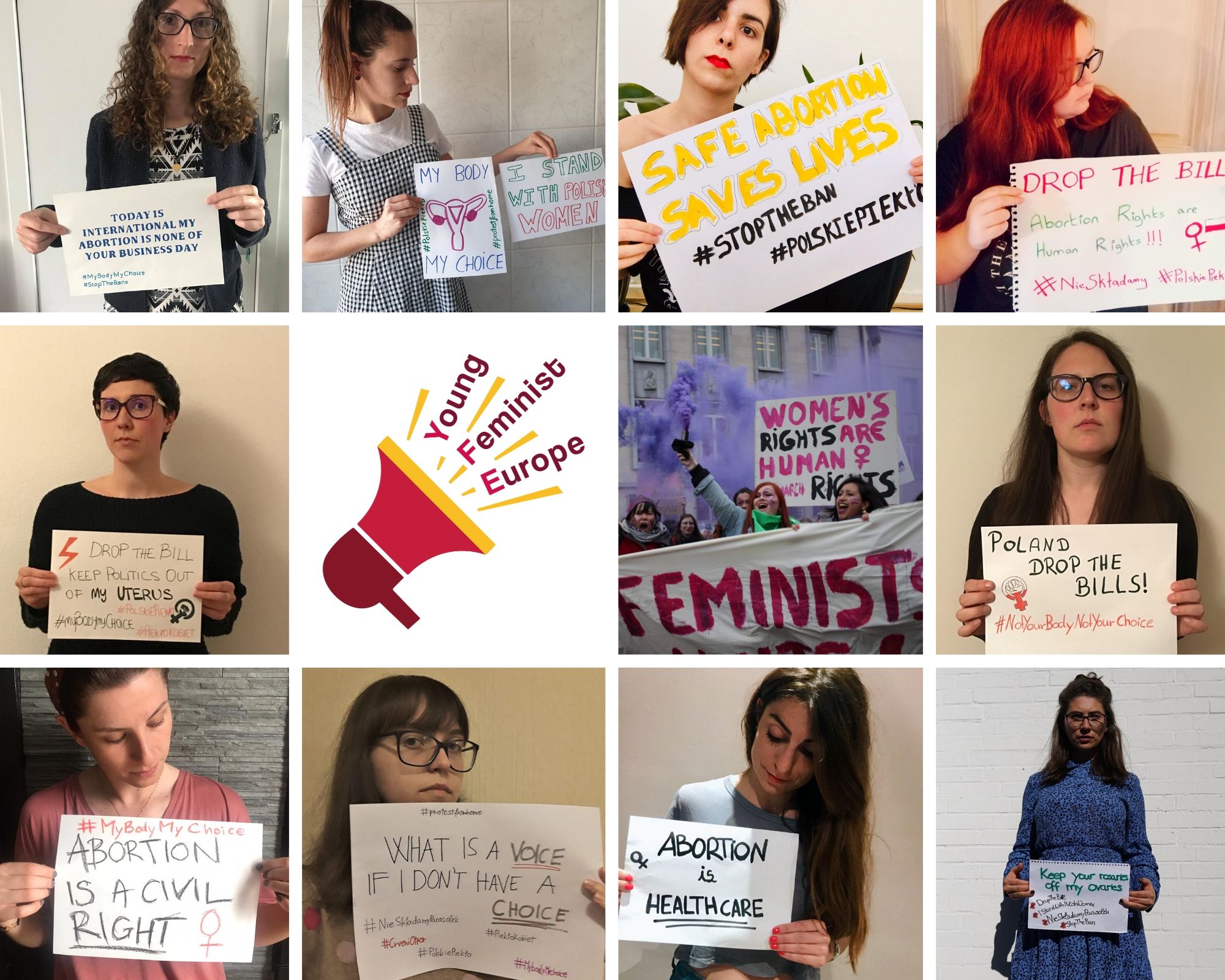Interview by Iva Zelić for Libela
Young Feminist Europe launched the #MyClitCounts campaign. As the very name of the campaign suggests, the young women behind it aim to put a special emphasis on women’s pleasure and on the various issues women face today.
What activities make up the campaign? Why is a vaginal orgasm still ‘normal and usual’? Is the female body becoming a political battlefield? What about the rights of women in childbirth? How does menstrual stigma affect the education of girls and women? Is sexual violence normalized? We talked about all of this with Nikolina Blažanović and Joana Gameiro.
Through the #MyClitCounts campaign you want to remove social taboos about sexual pleasure, and sexual and reproductive health and rights. How did the campaign come about and what activities have you done so far?
Joana Gameiro: Young Feminist Europe along with Amazone, the CLEF, Dessine-moi un clito, Reussir Equal Femmes-Hommes, and a number of academics and activists, launched the first-ever World Clitoris Day on 22 May 2019. For the occasion, a giant clitoris was stationed outside the European Parliament in Brussels to inaugurate the day and to raise awareness. The campaign was then launched in September 2019, as a continuation of World Clitoris Day. The name of the campaign was coined during a discussion among young feminists who were venting about the orgasm gap, like “Hello, my clit counts, acknowledge it!”
The campaign aims to tackle social taboos surrounding women’s sexual pleasure, gynaecological health, and reproductive rights. Through a series of campaign actions (workshops, webinars, podcasts, and articles), young feminists from across Europe have been engaging to discuss and bring about change on topics surrounding women’s bodies.
For instance, ‘Fem-Vibes’, Young Feminist Europe’s podcast, where we interview young feminist activists on a range of topics connected to the campaign. For this series, YFE’s activists have interviewed pro-choice grassroots activists fighting for abortion healthcare in Italy and Ireland as well as youth activists from the End FGM European Network.
We have also organized our first “Building Feminist Futures: My Body, My Rights” workshop in November 2019, where co-creators (participants) shared their visions of how our “feminist village” would look like and operate, and amplified current realities by describing our experiences and knowledge.
Through the launch of Young Feminist Europe’s webinar platform, under the #MyClitCounts campaign, we wanted to not only showcase young feminist expertise on the range of topics connected to the campaign but to provide a space for learning and knowledge exchange from an intersectional perspective. We organized webinars on a variety of topics – from digital violence against women, the institutional history of sexual and reproductive health, sex education to virginity and sexuality in black communities. On Saturday 30 May, as part of the #MyClitCounts campaign, Young Feminist Europe and Louisa Lorenz hosted the ‘Clit Talk‘ – a mini-workshop that aimed to debunk some myths and misconceptions surrounding the ‘unknown organ’.
Finally, the Writers’ Hub is a platform that provides a much-needed space for knowledge exchange between young feminists, where they are able to connect, engage, and create across borders. We have shared several articles related to women’s sexuality and SRHR since the campaign was launched. Of course, there is always our monthly newsletter through which you can find out what we do, when and how, see our recommendations for reading, listening and watching, and our feminist of the month, everything in one place.
Women’s sexual satisfaction is still much less talked about compared to men’s pleasure. The clitoris is still not given enough attention and many people still believe that vaginal orgasms are ‘normal and usual’ orgasms women experience. However, many studies show that a relatively small number of women experience orgasms during vaginal sex. Why is this still the case in 2020?
Joana: Freud’s idea of ‘vaginal orgasm’ as the ‘normal orgasm’ still dominates social discourse even though it is proven that only one-third of women are capable of achieving orgasm with penile penetration alone (no clitoral stimulation involved). Even the myth surrounding the existence of a G-spot is contributing to that as many women feel frustrated if they, supposedly, don’t have it. But not being able to orgasm with only penile penetration, as male standards impose, is not a flaw at all. In fact, the vagina is just the internal female sex organ. Focusing on the vagina as the main female organ is wrong because the vulva is made up of many neglected external genitalia, and in fact, the clitoris is the only female organ responsible for pleasure. The myth of vaginal orgasm is only a part of the problem. The Durex Global Sex Survey showed that 64% of men orgasm during sex while only 48% of women orgasm. Why is this orgasm gap happening? There are many reasons why.
Firstly, it is still not normal to have serious and informed conversations about sex and sexual pleasure and, from an early age, girls are taught about what society expects a good girl to do and not to do. Girls’ and women’s bodies and anatomy are labeled as dirty and sinful, as a form of social control over women. This leads them to not explore their bodies and to be ashamed to talk about masturbation or the best ways to have pleasure. Not knowing about their bodies and how it works puts girls and women at a disadvantage when engaging in sexual relationships. The majority of heterosexual women are learning about sexuality from their male partners who are more often than not, uneducated about women’s bodies.
Moreover, the clitoris is a symbolic representation of gender inequality as a whole because of how it is overlooked in medical fields, when in comparison to the penis. It wasn’t until 1998 when Helen O’Connell connected all the internal parts of the clitoris as one structure. However, even today medical school manuals still display inaccurate representations of the clitoris and even medical staff like gynecologists are ashamed of talking about it or asking questions related to people’s sexual lives.
Sex education, if provided, doesn’t cover sexual pleasure. It only focuses on the reproductive side of sex and actually, people are incentivized to prevent pregnancies. If not to have pleasure, why are people having sex when trying to avoid pregnancies at the same time? Indeed, the reason is that male pleasure is very much incentivized and praised in our societies, while women’s pleasure is often ignored and deemed irrelevant or even shameful.
The female body is increasingly becoming a political battleground when we talk about a woman’s right to decide about her body. The Reproductive Justice Platform conducted a survey in April this year on the actual availability of legally induced abortion in Croatia. The research showed that in eight out of the 29 authorized health institutions, abortion cannot be performed on request or that the information can not be obtained on whether it is performed in the institution. It is most often a collective ‘conscience appeal’ in these hospitals. In addition, we are witnessing abortion bans around the world, as well as an increased difficulty to access abortion during the COVID – 19 pandemic. In your opinion, what kind of struggle awaits us in the ‘new normalcy’ of 2020? And on the issue of Croatia, but also internationally.
Nikolina Blažanović: We have been talking about SRHR since we started the #MyClitCounts campaign last September, and this issue has become even more crucial since the start of the global pandemic. Health experts have been warning that governments should be prepared for a situation like this, but they weren’t. During these times, we have been observing a decrease in the provision of sexual and reproductive health services as well as mobility restrictions and changes in health-seeking behavior.
A survey by IPPF shows that across 64 countries, 5600 clinics have already closed because of the outbreak. At Young Feminist Europe, we’ve issued a joint civil society statement outlining the need for European governments to ensure safe and timely access to abortion care during the COVID-19 pandemic. We have also protested in solidarity with Poland and all other countries where abortion rights are under attack. Emma Rainey, YFE’s Campaigns and Advocacy Co-coordinator, has written an article underlining the difficulties that women are encountering in different countries to access abortion healthcare services.
We do see hope in Croatia because the survey by Ipsos showed that 81% of citizens believe women in Croatia should have the right to access healthcare, 63% believe abortion should be free, and 62% that religious communities should not interfere in health policy issues around abortion. While anti-choice groups are focused on harassing women outside of hospitals, 300,000 children are currently living in poverty in our country. During the pandemic, they are even harder to get to despite the recent call of the European Parliament to the EU member states to ensure their citizens have continued access to reproductive services, including abortion, during the Covid-19 pandemic. Thus, we truly hope that things are not going to get worse, and only hope for an improvement on our rights.
The treatment of women in childbirth is one of the topics that have been increasingly represented in the media space in the last few years. From Rodina’s campaign #BreakTheSilence, which started in 2014, to the testimony of MP Ivana Ninčević – Lesandrić, which encouraged many women in Croatia to share their stories. On your website, you state that as many as 21% of women have experienced some form of physical or psychological obstetric violence and that 41% of women consider the way they are treated during childbirth to be harmful to their dignity. Part of this is often justified by the ‘rules of the profession’. Given the increasing number of campaigns aimed at raising women’s awareness of childbirth rights, have you noticed any positive developments lately?
Joana: This topic was actually the topic of my Master’s thesis. The idea that women deserve pain stems from a general social and religious misconception about pregnancy as a consequence of sexual debauchery. The illicit treatment and disrespect of pain in women during childbirth is partly related to the stereotype of women as primarily mothers. If the birth process is considered part of the social function of motherhood, it is perceived as something natural that women should not complain about. Research has shown that women from marginalized communities, such as racial and ethnic, refugees, unmarried women, and adolescents, are more exposed to obstetric violence which can ultimately cause morbidity or mortality. In my paper, I conclude that in order to end childbirth violence, it is necessary to eradicate gender stereotypes related to women’s subordination to men and their role primarily or exclusively as caregivers and mothers. States must adopt a gender-sensitive approach to health to ensure that health workers are adequately trained to provide quality sexual and reproductive health procedures with full respect.
Nikolina: Regarding the specific situation in Croatia, we do not have knowledge of recent scientific studies on the topic which is symptomatic of a wider problem of lack of reliable data about maternal health and obstetric violence. We needed two great #BreakTheSilence campaigns to let the public know the reality of the treatments. The campaign itself has been a tremendous effort to raise awareness about obstetric violence and I really hope it has brought a lot of change. I would like to take this opportunity to thank MP Ninčević-Lesandrić and all the women who bravely spoke up publicly, and said that such treatment is not and must not be acceptable.
On the campaign page, you also state that ‘menstrual stigma’ directly affects the education of girls and women. In what way?
Joana: The issue with menstrual stigma is that women and girls are impacted in many different ways depending on the geographical area, the social and economical background, and the investment of their governments on their health and education. The stigma leads to the lack of recognition of young women’s specific needs and the lack of investment in proper measures to erase period poverty and high absenteeism rates. In Europe alone, nearly 95,000 young women miss out on school and other activities during their periods. Period poverty is an issue that goes beyond not having money to buy sanitary products. Having access to safe, private, and accessible toilets with access to water, soap and proper bins at school is a given fact in most Western European countries. Nonetheless, a study conducted on menstrual poverty in Macedonia revealed that 90% of female students in rural areas do not visit school for 4–5 days while menstruating and the main reasons provided for these high absenteeism rates were the inadequate conditions and infrastructures for managing menstrual hygiene at school.
Moreover, due to the stigma surrounding bleeding, in many communities, young women have to find ways to hide or destroy menstrual hygiene products, even washing disposable pads to remove traces of blood before throwing them away. Due to stigma, girls face a great deal of misinformation when it comes to how to manage menstruation in safety and dignity. For instance, the lack of access to proper menstrual products leads women to use cloth or damp pads, which increases the risk of yeast infections, urinary tract infections which also contributes to more absenteeism. To keep girls in schools and provide equality of opportunities, the governments should make it a priority to build proper facilities, provide girls with sanitary products and provide safe spaces at school where girls can learn how to manage adequately their periods. It is time to end the stigma on all levels.
As part of the campaign, late last year you organized a workshop to discuss violence against women in the ‘digital age’. It has been said that sexual violence, especially in pornography and through a ‘culture of rape’ has been completely normalized in today’s generations. What were the conclusions of the workshop? How does this affect young women across Europe?
Nikolina: The webinar was held by Asha Allen from EWL, who deals with the eradication of all forms of violence against women, with an emphasis on the #HerNetHerRights project, which deals with violence against women in the digital space. As we can see in the comments on social networks – the success of a man is his, and the woman’s is achieved through the bed. The mountain of disgusting comments directed at women only because they are women and because of the thought patterns of insults towards women from everyday life, with anonymity and apparent inviolability, are further intensified on social networks. The cause of everything is the hypersexualization of women, which comes down to the body.
When you look at the most-watched pornography, underage and violent porn (even the display of violence against women), are on top of the list. Women are always called degrading names, and men are not. All of these things, as well as the culture of rape, are extremely complex problems and until we take a common firm condemnation at the level of society as a whole, there will always be a hole. If anyone is further interested in the topics of the digital world, I would suggest Angelika Hild’s article on digital violence targeting female sexuality and Christine Wunder’s article on the reasons for the need for greater involvement of women in the development of artificial intelligence.
And lastly – what else awaits us by the end of the year in the campaign? And where can we all follow you?
Nikolina: As the COVID-19 pandemic has disrupted our plans a bit, we are preparing podcasts, webinars, articles and other ways of engaging young feminists at home. You can follow everything through our page Young Feminist Europe and social networks (Facebook, Instagram, Twitter). We are also actively involved in the Beijing+25 and Gender Equality Forum. If you want to follow our activities and various opportunities regularly, we have our own newsletter that comes out every month.
*This is the English translation of the original interview in Croatian with Iva Zelić from Libela.





![Abortion rights in Croatia 4 years later – Pravo na pobačaj u Hrvatskoj 4 godine poslije [EN/CRO]](https://www.youngfeminist.eu/wp-content/uploads/2019/09/Safe-Abortion-Day-150x150.png)

Average Rating